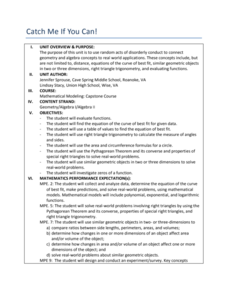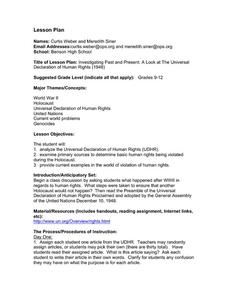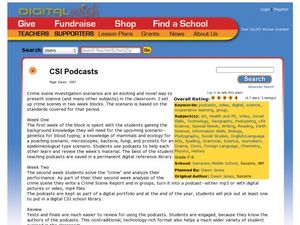Curated OER
Problem Based Learning
Students increase problem solving skills. They research computer-related crimes, classifying them into the types of crimes. Students create a crime report. They present a presentation to the class.
Radford University
Catch Me If You Can!
Crime doesn't pay, but everyone can learn from it. Learners consider different situations involving mischief at a school, such as stink bombs and rockets, and analyze them using mathematics. They must apply trigonometry, quadratic...
US National Archives
WWII: Western Europe 1939-45 – Hamburg
Was bombing German cities an effective means to an end, or was it a war crime? Could it be both? Young historians ponder these questions with an activity that prompts them to use primary sources to summarize the debate surrounding RAF...
Purdue University
The Case of the Pilfered Pin: A Measurement Inquiry Activity
Who pilfered the pin? Scholars practice measurement skills as they solve the mystery of a stolen pin. They measure length, temperature, and mass and determine which of select suspects committed the crime. During the STEM hands-on...
Curated OER
Zen and the Art of Murder
Students describe the importance of citizen involvement in the judicial system. They play the role of a witness to a crime scene by watching the video clip. Students discuss how differing eyewitness accounts can affect a police...
Curated OER
Should Hate Be Outlawed?
Students investigate hate crime legislation. In this hate crime lesson, students examine the St. Paul city ordinance that outlawed hate crimes. Students explore the fine between hate crime legislation and First Amendment rights.
Curated OER
The Youth Criminal Justice Act
Students review the Youth Criminal Justice Act and examine the consequences for young people who commit crimes. They investigate the rehabilitation and reintegration processes associated with the act.
Intel
Forensics: Get a Clue
Although the methods are all scientific, forensic science was started by police officers rather than scientists, who relied on observation and common sense. Young detectives use many tools to solve crimes around the school in a...
Curated OER
Investigating Past and Present: A Look at The Universal Declaration of Human Rights
Young scholars compare the Universal Declaration of Human Rights to the war crimes of WWII. In this lesson on Human Rights, students evaluate the causes of WWII, war crimes, and determine whether the outcome might have been different...
Curated OER
Biographical Scene Investigators
Sixth graders become members of the BSI in this research simulation. They apply for Biographical Scene Investigator membership, investigate an individual, keep an evidence notebook and write an investigator's report.
Curated OER
Communication: Gender Issues
High schoolers participate in a lesson that investigates the different ways that people communicate. The roles of gender in communication is covered by using the book "Men Are From Mars, Women Are From Venus". They also write the meaning...
Curated OER
War and International Law: A Brief History of the Law of War
Students investigate the history of the law of war. For this international law lesson, students listen to a lecture regarding the history of international law spanning from Pax Romana to Collective Security. Students respond to...
Curated OER
Sherlock Holmes Database Investigation
High schoolers conduct a character study using the literature of Sherlock Holmes. They use a database with different cases that need to be solved. Students use the computer software to work through a list of suspects and match them with...
Curated OER
Confectionary Bureau of Investigations: Case of the Cookie Mystery
High schoolers perform tests on different chemicals to determine their chemical properties. In this forensic science lesson, students identify an unknown sample using its physical and chemical properties. They solve a fictional crime...
Curated OER
Surveying Society's Attitudes About Crime
Young scholars investigate how crime reporters do their jobs and how the news of crime gets reported.
Curated OER
Researching Hate Crimes: Who and Why?
Students research contemporary information on hate crimes and on legislation designed to curtail and control such activity. They discuss the distinctive nature of hate crimes as opposed to other types of violent crimes. Students work...
Curated OER
CSI Podcasts
Students investigate crime scene scenarios to meet standards. In this crime scene scenario lesson, students gather background information during the first week. They investigate topics such as mammals, genetics, bacteria, or fungi. They...
Curated OER
The Crittenden Conway Duel
Young scholars explore primary and secondary sources. For this primary and secondary source lesson, students investigate a crime scene. Young scholars search for evidence around the classroom and evaluate their findings. Students write a...
Curated OER
Can I Get A Witness?
Young scholars consider difficulties involved in students testifying in criminal trials. Through first-hand experience in the position of either a witness to a crime or an investigator, young scholars explain how various factors shape a...
Curated OER
Under the Collar
Students first examine different types of white-collar crimes; they then research recent individual cases to present in a student-written and produced expos?? program on white-collar crime.
Curated OER
Blood Typing Investigation
Young scholars role-play a scenario in which a car crash patient is inadvertently given the wrong blood type during a transfusion. They perform blood typing and explore the genetics behind ABO and RH blood types using simulated blood.
Curated OER
The Visible Spectroscopy Expert Witness Problem
In a simulated crime science investigation, chemistry or physics sleuths use spectroscopy to analyze solutions. The activity gives learners practice making salicylate solutions, using spectrophotometers, calculating dilution amounts,...
American Documentary
The Benefits and Drawbacks of Plea Bargains
The outcome of 90 percent of criminal cases in the US is determined by plea bargains. Clips from the documentary Better This World create the backdrop for an investigation of the benefits and drawbacks of the plea bargaining process....
Curated OER
Crime Time
Students examine fundamentals of American criminal justice by analyzing each step of the criminal process. They follow the process of a well-known or publicized criminal case in The New York Times, and keep a journal of its newspaper...

























